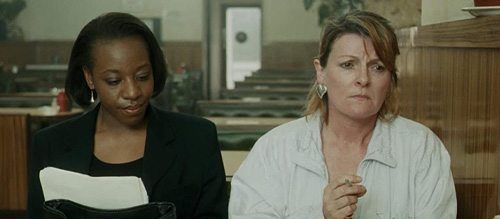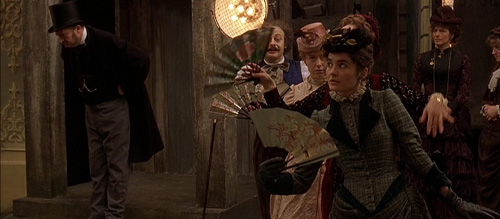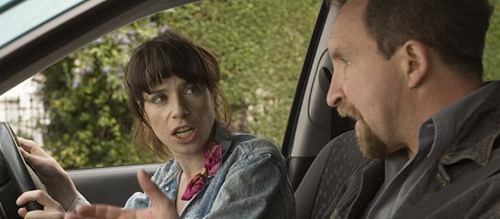Where to Start with Mike Leigh
Born in Hertfordshire and raised in Salford before moving to London to pursue the arts, acclaimed British filmmaker Mike Leigh’s early career as a RADA-trained actor quickly took a back seat to his passion for directing grounded, genuine stories for film and the stage.
Beginning his work behind the camera on televised plays for the BBC, such as the iconic uncomfortable chamber piece ‘Abigail’s Party’ starring Alison Steadman, from the beginning Leigh was a proponent of many months of intensive, theatre-style rehearsals with his his actors in an effort to discover the truth of their characters.
The “Leigh Method” is often so convincing that viewers mistakenly believe his films to be all or partially improvised, when in fact they couldn’t be more carefully choreographed affairs. His actors tend to live as their characters for months before filming so that their every line and direction provided by Leigh feels natural and authentic, even instinctual to them, his ultimate aim being to always create “emotional, subjective, intuitive, instinctive, vulnerable films”.
Leigh’s regular collaborators, who always benefit from his working method, include Timothy Spall, Jim Broadbent, Leslie Manville, Philip Davis, Sally Hawkins and Ruth Sheen, as well as his late producer Simon Channing-Williams (co-founder of Leigh’s Thin Man Films) and cinematographer Dick Pope.
Over five decades and fourteen features, Leigh has crafted contemporary kitchen sink dramas, relevant critiques of traditional gender roles, and hard-hitting psychological studies, as well as delving deep into Britain’s far-from-rosy past. He has also been a champion of the arts and of truly independent art at that, never compromising his vision or his chosen way of working even if it limits his more mainstream and commercial success.
But where should you start with this multi-award winner and recipient of the BAFTA fellowship? There’s probably no wrong place to begin here, but there are undoubtedly more harrowing entries in his filmography that should probably be gradually built up to. As one possible route of entry, we offer this recommendation on Where to Start with Mike Leigh.
1. Secrets & Lies (1996)

Mike Leigh’s films often seem to have dropped you right in the middle of an everyday domestic scene that is already unfolding, but the plot of Secrets & Lies, while always feeling completely truthful, is anything but everyday.
Secrets & Lies follows Hortense (Marianne John-Baptiste), a black British optician who is attempting to track down her birth mother who gave her up for adoption as a baby. Surprisingly, her mother turns out to be the white factory worker Cynthia (Brenda Blethyn), and the two begin meeting in secret before Hortense is introduced to the rest of Cynthia’s dysfunctional family at a birthday barbecue for her other daughter Roxanne (Claire Rushbrook) and perhaps inevitably a very difficult conversation comes around.
Everyone in a Mike Leigh film feels like they’ve lived a full life before we’ve joined them, a life that will continue on as normal long after we leave. The impressive ensemble of Secrets & Lies all have their stories, their hangups, their myriad personal issues to confront. Hortense just wants to know where she came from; Cynthia wonders what might have been if she hadn’t had her first child unplanned as a teenager; Roxanne struggles to connect with her mother and open up about her own relationships; Cynthia’s brother Maurice (Timothy Spall) and sister-in-law Monica (Phyllis Logan) are, respectively, an ineffectual doormat and a passive-aggressive depressive.
The two centrepiece sequences of the film, Hortense and Cynthia’s first soul-bearing face-to-face meeting in a café and later the barbecue where everything comes out in the open and emotions boil over, are among the most memorable in British independent cinema. The personality clashes are explosive and the emotions raw and painful, but there are funny moments as well, and none of the drama ever feels manufactured, anything less than a spontaneous. This is a natural and ugly representation of humanity at our best and worst.
Secrets & Lies is Leigh’s tribute to modern British families whatever shape they take, warts and all, and it has only become more affecting over time as the view of what a “normal” family is has become less easy to define, the film surpassing its BAFTA wins and Oscar Nominations to become a popular favourite especially among those who feel like they’ve never quite belonged.
2. Topsy-Turvy (1999)

Most of Mike Leigh’s period dramas are excellent, but Topsy-Turvy is undoubtedly his least bleak and upsetting trip into the past, balancing the same meticulous attention to detail of Mr Turner or Vera Drake with infectious energy and humour that those films often understandably lack.
An ambitious biopic of W.S. Gilbert (Jim Broadbent) and Arthur Sullivan (Allan Corduner), Topsy-Turvy focuses on 1884-1885 and the lead-up to the premiere of one of their most ambitious and troubled collaborations, “The Mikado”. The lucrative and critically successful creative partnership, with Gilbert providing lyrics and Sullivan composing their operas, had began to falter by this point in their careers and both men clearly had very different priorities in life and in art.
Set during the period of Victorian England’s fascination with all things Japanese following the East Asian country’s opening up to trade with the West, the film presents many uncomfortable attitudes to Japan and its culture. Yes, it’s deeply upsetting to see Jim Broadbent squinting his eyes and swinging a katana around in his dressing gown, Andy Serkis as a flamboyant, pipe-smoking choreographer trying to teach the women in the cast to move like Japanese ladies, and the exaggerated application of makeup employed to make British actors look Japanese on stage, but it is authentic to the time and place and adds to the tactile richness of the production design in general.
None of the ensemble cast playing opera stars (including Timothy Spall, Kevin McKidd and Shirley Henderson) are professionals in the style, but they do a remarkably convincing job of it, especially considering that many of their own vocals are used in the final film. They also all, but especially Broadbent and Corduner, flesh out their troubled artists’ professional and personal lives, and the runtime just shy of 3 hours gives every character and subplot room to breathe while never threatening to lose your interest by peppering the story with plenty of entertaining backstage drama.
With Topsy-Turvy, Leigh deconstructs two icons of English culture, bringing them down to the level of mere mortals, and explores how much passion and creativity, but also petty squabbles and selfishness, goes into making the most lasting pieces of art.
3. Happy-Go-Lucky (2008)

About the closest Mike Leigh has come to a truly feel-good movie (though this still has more than a few shades of darkness), comedy-drama Happy-Go-Lucky is a great way to ease yourself into the British director’s oeuvre.
Happy-Go-Lucky is the story of Poppy (Sally Hawkins), an endlessly cheery primary school teacher going through life powered by her friendships and an unshakeable positive outlook on the world, no matter who she encounters or who may want to stamp it out.
While she had been seen on TV and had supporting roles in Leigh’s All or Nothing and Vera Drake, it was Happy-Go-Lucky that catapulted would-be Oscar and BAFTA nominee Hawkins into the limelight, and for good reason. You have to wonder how many real people’s lives Hawkins brightened in the months she was living as Poppy in London, though you also find yourself thinking that while she’d be a great person to know, you may perhaps avoid seeing her every day in order to avoid exhaustion.
We accompany Poppy on a series of experiences, from supporting bullied kids at school to finding time for her love and social life and flamenco dance classes, but the most memorable moments in the film by far are Poppy’s driving lessons taught by the volatile Scott (Eddie Marsan) – every scene they share together is even more tense than the last. Scott the driving instructor is a frankly terrifying creation who starts out seemingly just short-tempered and more than a little obsessive when it comes to Poppy’s short attention span and inappropriate footwear, but is gradually revealed to be a full-blown conspiracy theorist with an assortment of deep-rooted issues.
It’s here in particular that we really see how special Poppy is, that she shows empathy to everyone she encounters in life no matter how she is treated in return, and while anyone can make cheery small talk in a shop or show kindness to a homeless man, she can so easily switch modes from her joker default to showing genuine concern for Scott, a clearly disturbed man in need of help, even after she has been at the end of a tirade of verbal and physical assault.
Happy-Go-Lucky gives you a little hope in a world that sometimes seems to contain very little and lets you in on a snapshot of the complex personal stories of the everyday people you pass in the street. Occasionally, someone telling you to “Smile, it might never happen” really does come from a good place, and everyone could probably do with a Poppy in their lives… in small doses.
Recommended for you: Where to Start with the Cinema of Peter Cushing
Mike Leigh is one of the most vivid and authentic UK filmmakers of the last fifty years, and just about every one of his feature films and work in the theatre and television are worth experiencing. Beyond the three suggestions above, Naked, Life is Sweet and Mr Turner in particular are worth your commitment, as hard as they are at times to watch. Sharing an equal role with his actors in creating real and memorable characters, and capturing the mundane with a beautiful eye, Mike Leigh holds a mirror up to British society from across the decades, and celebrates and lambastes in equal measure who we are and more importantly, why we are.

